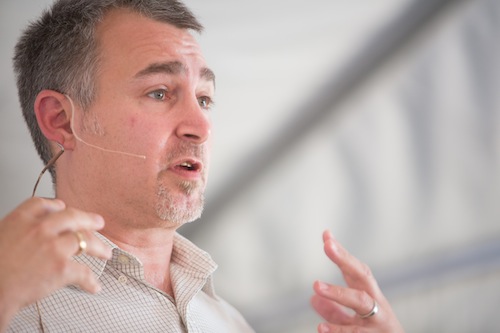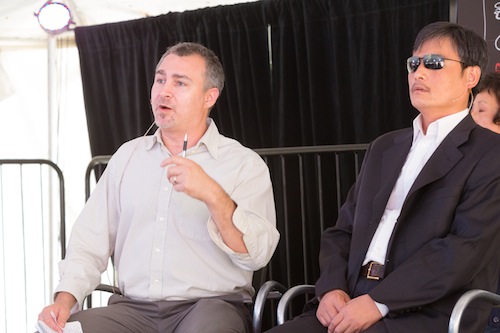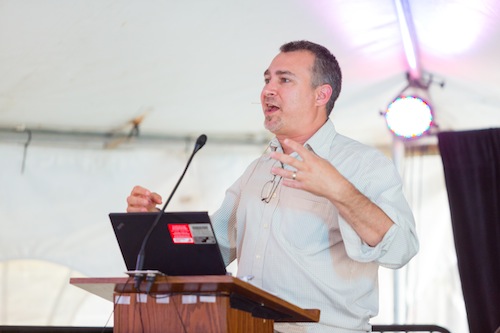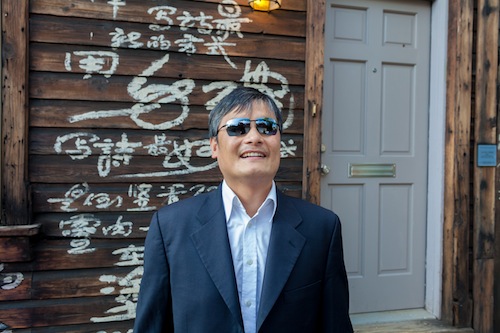Andrew Jacobs: Telling the World About China
by Justin Karter / July 8, 2013 / 1 Comment
An exclusive conversation with a reporter in the Beijing bureau of The New York Times.

Journalist and correspondent for the Beijing bureau of The New York Times Andrew Jacobs speaks at Exiled Voices of China and Tibet. Photo: Renee Rosensteel.
The current controversies over press freedom and surveillance in the United States and China have called into question the attitudes both countries have towards free speech and censorship. Andrew Jacobs’ career as a journalist and correspondent for the Beijing bureau of The New York Times provides him with the experience to speak on the issues, both at home and abroad.
Though Jacobs often reports on politics, human rights, and free speech, he is also a writer, director, and documentarian. “Four Seasons Lodge,” Jacobs’ 2008 documentary, plays on familiar themes of oppression, survival, and triumph as it explores a community of aging Holocaust survivors.
Beginning in 2009, Jacobs provided extensive reportage on the story of Chinese dissident and lawyer Chen Guangcheng. This year Jacobs joined Chen in Pittsburgh for City of Asylum’s Exiled Voices of China and Tibet event to help convey the story of Chen’s brutal detention, dramatic escape, and ongoing battle for freedom.
In this interview Jacobs talks about his unfettered press movements in China (excluding a hacked email account and once being swatted with a broom), the long-term consequences of China’s censorship policies, and his take on the state of freedom of speech in America.
Tell us about how you went from being a journalist based in the United States to one who covers China for The New York Times.
I have been at the Times since 1998. Before I became a journalist, I had a background in China: I had studied Chinese in college and then became an English teacher there in the 80s. Then, in 2008, China was gearing up for the Olympics. At that time there was a lot of unrest, some rioting in Tibet, and then there was an Earthquake in Sichuan, so the Times needed extra bodies. I originally went there temporarily, but it became a long-term thing.
When you were in China in the late 80s did the revolts at that time have a strong impact on you?
Yes. I was in a city called Wuhan, in central China, and there were lots of protests. My students, along with everyone else, left the campus and went down to the bridge that connects the north and south of China. The protesters blocked the tracks, basically paralyzing transportation across the country. That went on until the army cracked down on the movement in Beijing and after that everyone got worried and fled. So that was a direct impact, in terms of my students. Then I had to leave, because most foreigners were encouraged to flee.

Jacobs presents Chinese dissident lawyer Chen Guangcheng at Exiled Voices of China and Tibet. Photo: Renee Rosensteel.
You’ve faced some resistance since you began covering China. In February 2011, you tried to meet the Chinese human rights lawyer Chen Guangcheng when he was under house arrest. You released a video that shows how hostile the Chinese police were when you went to Chen’s house. Is that a reflection of your experience as a whole?
No, that was unusually dramatic. Normally reporters don’t get attacked by old men with brooms or get roughed up by thugs. However, it’s not unusual for the police to treat Chinese dissidents brutally. There is unspeakable torture. But journalists are usually insulated from that because the Chinese government recognizes that it makes bad footage. Generally, journalists go to a place and the most they can do is very politely block you from going somewhere, or stop your car.
Most of the reporting I do is unhindered. Also, because I’ve become good at avoiding trouble, I turn off my phone and take out the SIM card. I don’t check into hotels until the end of the day because every time you check into a hotel you have to take out your passport, which goes immediately to the Public Security Bureau, so the government officials know you’re there. There are ways you can minimize your contact with the Public Security folks, but generally foreign journalists in China enjoy freedom.
You’ve had had some firsthand experience with censorship, however. In April 2010, you wrote the article “I was Hacked in Beijing.” Is the experience of being hacked still common?
Well, it’s quite common, actually. At the time I was using Yahoo and they somehow went into my mail and put an unknown forwarding address into my account so that all my correspondences were going to the strange address. I didn’t think to go in there and look, so when I found out, I didn’t know how long it had been going on. But I think we all have long since assumed that our emails are being read in China and we don’t write anything that will get anyone in trouble. We assume that we’ve all been hacked and that the government will know everything we do anyway.
To what extent do business interests have an impact on Chinese censorship? If there is a market for a certain kind of material, how long can the government stand in the way?
Well, there are plenty of nonpolitical ways to make money. Look at movies. Think about Hollywood: Most films made are action, comedy, drama. However, in China there are certain kinds of films you cannot make. You cannot make homicidal maniac films, you cannot make zombie films, you cannot make the world-is-coming-to-an-end films that touch on evil, corrupt governments. All those topics make the Communist Party nervous and there are a lot of frustrated filmmakers in the country. There are certain subjects that just cannot be filmed. For example, you can’t even make time travel films because it may take you back to an area of history that might make the government look bad. But to that end, I do think that China’s policies are harmful in the long run. Those policies damage its cultural capital, its international soft power, and its image around the world.
In February you profiled a Chinese citizen journalist, Mr. Zhu, who was on a one-man mission to expose government corruption. In the article Mr. Zhu says that Chinese citizens have come to rely on the Internet and “netizens” for retribution, even if it often amounts to mob justice. Do you see a growing presence of citizen journalists in China and how has that changed the landscape for journalists?
It’s a mixed bag. There are definitely citizen journalists who get their stuff out there. It depends who they go after, however. If they go after a high-level official it will get zapped off the internet. What Mr. Zhu does is go after corruption in fairly low-level officials. Once it spreads way out there on the Internet, the government has to use some pretty big connections to pull the plug on it. Chinese internet companies are the ones who actually do the censoring for the government. So there is a certain bandwidth in which citizen journalists can do their work, but it’s not that broad, and it’s getting narrower. However, I think the rise in citizen journalism puts pressure on mainstream journalists to do stuff of substance. There are a lot of frustrated Chinese journalists.
As evident in the stories about Mr. Zhu and Mr. Chen, your articles often make use of a compelling individual or event that speaks to a larger issue. Can you talk about the role journalists play as storytellers in informing and engaging the public on important issues?
I think as human beings we require some empathy and a connection to another human being to get really into a complicated subject. I always try to find a person with a story to get the reader to connect initially. I guess I’ve always had a weakness for the underdog, the little guy, so I am drawn to those characters. I try to use them to tell bigger geopolitical stories.
Is there tension between the journalist in you who wants to objectively report through that wide, geopolitical scope and the storyteller who wants to artfully capture an individual’s experience?
Yes. Even by choosing who you cover you are limiting the story and giving up a tiny bit of objectivity. Just by selecting a character you are saying something about your belief system and point of view. I try to balance my articles as best as I can, but it’s hard in China because often there is no other side to talk to. The government officials won’t talk to the foreign media. In the States, if you’re writing about an activist, you’re always able to get the other side of the story. Whether it’s a corporation or a local government, there is always someone you can talk with to hear the other side. In China, no one answers your calls or faxes so it’s almost impossible to get the other side of the story. China does this to its own disadvantage.
Let’s talk about the relationship between China and the West via the stories you have covered. Chen was eventually able to escape house arrest and make it to the United States’ embassy. How did that affect the diplomatic relations between the United States and China at the time?
I think it was a pretty big problem at the time. Hilary Clinton had just happened to arrive in the country. She was negotiating with China’s top diplomat. Her stay was temporary. I think the relationship between the US and China is pretty strong. It’s not easy to derail and I don’t think either side wants it to derail. Perhaps it’s a bit of a problem that the US is so keen on not derailing the relationship that it won’t push for certain things that I think, in other nations, it would push for, like human rights, cyber-hacking, etc.

Andrew Jacobs speaks about his experiences reporting for The New York Times in China. Photo: Renee Rosensteel.
Chen Guangcheng recently said that he has been asked to leave New York University following “great, unrelenting pressure” from Chinese authorities. What do you think of his and NYU’s statements?
I’ve been covering this story closely and I am inclined to think the controversy was more a misunderstanding, or if one were cynical, a manipulation of the truth by certain people who are close to Chen. I have yet to see any evidence that NYU was subjected to direct pressure from the Chinese government to end Chen’s fellowship. From what I can tell, Chen’s advisers made it fairly clear from the beginning that he would have to find another gig at the end of the year. Whether he believed that would truly happen is another matter. He and his wife seem to truly feel betrayed.
Is it paranoid to think that an American university is being pressured by Chinese authorities in both economic and diplomatic ways?
I think American academic institutions are increasingly vulnerable to such pressure from China, whether it be American China experts who need Chinese visas to pursue their research–and who might be inclined to avoid publishing material that could anger Beijing–or schools like NYU who are seeking to open campuses in China and need governmental approvals.
I think academia needs to be aware of such pressures because China does not hesitate to push back to get its way.
That said, the bigger danger is probably self-censorship and behaving in ways that one perceives will help curry favor with Beijing. For example, it appears that NYU’s president John Sexton never met with Chen Guangcheng during his year at the school. I don’t think it would be far-fetched to assume that he knew the optics of that encounter–with photographs that might be appear online–could have angered the Chinese. This would fall into the category of subtle, self-censorship that I think is becoming more common in academia, and in Hollywood, and among American business executives.
On the other hand, I somehow doubt that a Chinese official would call Sexton and tell him, “Get rid of that Chen guy or else!”
I think that kind of pressure would likely backfire.
The Time article “How China Sees the World” discusses how China views itself as an ancient civilization that was embarrassed by the West in its recent history. Do you see that legacy of Western oppression of China playing out in the minds of government officials today?
Yes, it is a device. It’s certainly true that there was a rough period when the West did abuse and subjugate parts of China. But that ended in the 40s. It was over by 1949 for sure; the Japanese were gone before then. But I think it has become a very convenient tool to rally people and it has become a legitimizing tool for the Communist Party. It’s a very blatant tool.
So, you’re saying that this propaganda persists as a governmental tool to control public opinion?
The problem is that, not only is it propaganda, but it has been absorbed by otherwise rational and intelligent people who now believe that the US is hostile to China. I don’t think the US is interested in containing China.
It recently came out that the US Government was obtaining phone records of Associated Press reporters, and that they were monitoring James Rosen at Fox News. Do you think that the next time the US tries to push for greater protection for journalists like yourself in China, the AP and Fox scandals might be used to accuse them of hypocrisy?
They probably will, but they will use anything at their disposal to discount any criticism.
Do you feel the reaction to the AP and Fox cases has been overblown, or is it a legitimate concern for journalists in the US?
I feel that it’s definitely a legitimate concern, especially in the AP case. I feel that it was abusive. I am alarmed by how far the Obama Administration has gone in terms of punishing leakers. That said, I do think that the coverage has been overblown, but that’s largely because of my experience in China, where the government’s motivations are purely malicious and where they are not just going out against terrorists, but people who are thinking and speaking differently in ways that potentially threaten the government. I don’t have any fear that this is beginning to happen in our country. We have a really solid system of checks and balances; we have freedom of the press. We have open information and a free internet. And you can see with this media reaction that the system is malleable and it works. That system doesn’t exist in China.
Will we see changes to censorship with the new government in China?
I would say no. I think it has only gotten worse and will be tighter in the near future. Tweaking internet searches is a brilliant new innovation in censorship because it denies you the awareness that you’re being censored. The government has created an Internet bubble. It’s a closed system: You will search for certain things and get nothing, or just nonsense. Even some of my Chinese friends who are very well-educated don’t know what I’m talking about when I bring up certain subjects.






One Comment on "Andrew Jacobs: Telling the World About China"
Hello, It is a nice post, thanks.